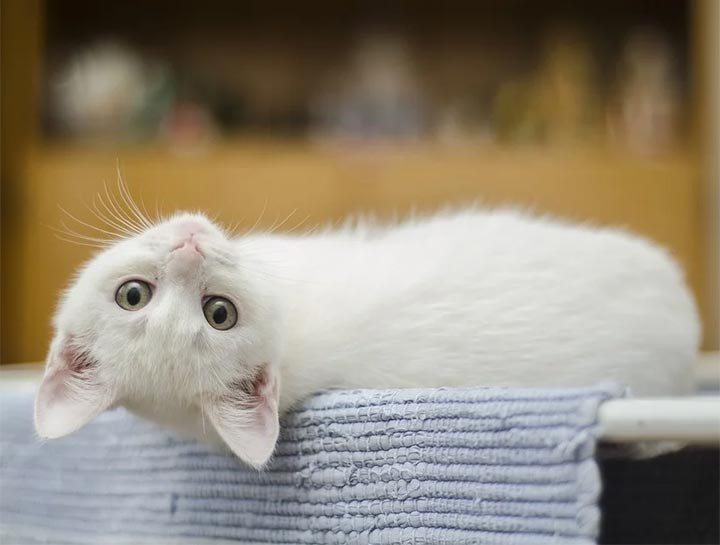Kitten Information

Congratulations on your new kitten!! Hopefully your new family member will bring you years of pleasure and companionship. With this pleasure also comes the responsibility of caring for your new pet. The care of your pet is a job to be shared by your family and your veterinarian. We believe the most effective way to maintain your pet's health is to try to prevent diseases. Preventative medicine is possible through the use of vaccines,good nutrition, laboratory testing, dental care, and spaying/neutering.
Vaccines are injections given to your cat to prevent certain diseases. Vaccines must be given at just the right time to be fully effective. Some of the diseases we currently vaccinate against are:
- Panleukopenia (distemper) - a virus similar to parvovirus in dogs, it can cause servere intestinal disease, problems with red and whiteblood cell counts, and often death. This is spread by direct contact with a sick cat or by contact with a person, litter box,food bowl,etc.that has been in contact with a sick animal.
- Upper respiratory viruses - a very common and contagiuos group of diseases that cause sneezing, coughing,eye infection and nasal discharge. Sometimes these can lead to chronic sinus infections. These viruses are spread through the air.
- Rabies - a deadly neuologic diseases that is always fatal and can be transmitted to people.
Feline Leukemia is a fatal virus that suppresses the immune system and causes multiple types of cancer. There is no cure for leukemia. Kittens can be born with the virus if their mother is infected. The only other way to catch the virus is through direct contact with an infected cat. Feline leukemia is NOT contagious to people or any other types of animals. We recommend that all kittens and cats be tested for the virus through a simple blood test. The best way to prevent this virus is by keeping your cat indoors and therefore preventing any exposure to an infected cat. If your cat does go outside, we recommend vaccinating against feline leukemia.
Feline Immunodeficiency Virus (FIV) is another fatal virus that affects cats. It is very similar to feline leukemia and to the human aids virus. It is only contagious to cats, and is transmitted from direct contact with an infected cat (or by being born to an infected mother). We recommend that all kittens and cats be tested for FIV (we offer a combined test to check for both feline leukemia and FIV). As with leukemia the best way to prevent the virus is to keep your cat indoors. We do not currently have a safe and effective vaccine to prevent this disease.
Intestinal Parasites(worms) are one of the most common diseases of cats. There are several different types of worms that live in the stomach and intestines of cats and can cause various diseases. Most of these worms can not be seen by the naked eye. Instead the stool must be examined under the microscope. Some of these worms can also infect people, especially children who are more likley to accidentally handle the feces. Worms are transmitted to your cat when it smells other animals stools,, eats infected rodents, or swallows fleas. If your cat lives strictly indoors, we recommend testing the stool once a year. If your cat goes outside we recommend testing every 6 months.
Spay/Neutering is very important part of maintaining good health. If you do not intend to breed your cat it is definintely in its best interest to be spayed/neutered. Spaying a female cat within the first year of her life will dramatically decrease her risk of developing breast cancer when she gets older. It will also prevent unwanted pregnancy, uterine infections and uterine and ovarian cancer. It will also prevent unwanted behaviors- cats that are not spayed will often cry excessively and urinate around the house, when they are in heat. Male cat urine develops a very strong and foul odor once they reach sexual maturity (between 9-12 months of age). Neutering male cats will eliminate this foul odor. Neutered cats are also much less likely to spray urine to mark their territory. One of the most common reasons that people get rid of their cats is due to problems with urinating out of the litter box. Neutering will significantly decrease the risk of this problem. If your cat is going outside it is critical that you get it spayed/neutered at 6 months of age. This will prevent unwanted pregnancies and also will greatly reduce the risk of your cat contracting feline leukemia or fiv. Unneutered cats are more likely to fight and interact with other cats, increasing their risk of these viruses.
Dental care is an important aspect of good health. Over time nearly all cats will develop tartar, gingivitis and other dental diseases. If you are able to brush your cat's teeth periodically it will help maintain good dental health. We can give you advice on how best to do this. Periodic professional cleaning is also essential. We will examine your cats teeth at every visit and let you know when a cleaning is appropriate.
Proper nutrition is vital to your cats health. There is a lot of confusion as to what kinds of foods are best for cats. We believe that canned foods fed twice daily are best for most adult cats, 3-4 times daily for kittens 3-4 months old. We recommend any national name brand food. Obesity is a major problem in cats and can cause numerous diseases and health problems including diabetes. Avoiding table scrapes, non-prescibed supplements and limiting treats is one way to help maintain a healthy body weight. For more information about diet, please call our office at (410) 744-4800.
Indoors vs. Outdoors One of the most important decisions you will make about your cat will be whether or not to let it go outside. As mentioned in the feline leukemia and FIV sections earlier cats that go outdoors have an increased risk of contracting these fatal viruses. Additionally, outside cats can get injured in cat fights, dog or other animal attacks and by cars. Studies have shown that outdoor cats have a significantly shorter life expectancy than indoor cats. We strongly recommend that all cats be kept indoors. Through playtime with toys, videos, kitty jungle gyms etc., your indoor cat be just as entertained and stimulated as any outdoor cat.
Household Hazards. There are a few household hazards that are more dangerous to cats than to other pets. Plants in the Lily family are extremely toxic to cats. Eating even one bite of a leaf can cause kidney failure and death. We do not recommend having lilies in the home if you own a cat. If you do find that your cat has eaten any part of a lily,please contact us or an emergency clinic immediately.Additionally, liquid potpourri can also be quite toxic and should never be left where a cat can get it.
Remember the good health of your cat is the result of a cooperative effort between your family and your veterinarian. We are here to help, so please do not hesitate to call upon us for assistance.
Flea Preventative
We have a variety of preventatives. Call our office to see which one works best for your cat!!
